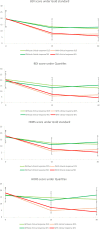Predictors of clinical response after rTMS treatment of patients suffering from drug-resistant depression
- PMID: 34782593
- PMCID: PMC8594436
- DOI: 10.1038/s41398-021-01555-9
Predictors of clinical response after rTMS treatment of patients suffering from drug-resistant depression
Abstract
Repeated transcranial magnetic stimulation (rTMS) is a therapeutic brain-stimulation technique that is particularly used for drug-resistant depressive disorders. European recommendations mention the effectiveness of 30 to 64%. The failure rate of treatment is high and clinical improvement is visible only after a certain period of time. It would thus be useful to have indicators that could anticipate the success of treatment and more effectively guide therapeutic choices. We aimed to find predictive indicators of clinical improvement at 1 month after the start of rTMS treatment among the data collected during the care of patients with drug-resistant depression included in the Neuromodulation Unit of the Esquirol Hospital in Limoges since 2007. In total, 290 patients with a pharmaco-resistant depressive episode, according to the Hamilton Depression Rating Scale (HDRS) (score ≥8), before treatment who underwent a complete course of rTMS treatment and did not object to the use of their collected data were included. The clinical response in routine practice, corresponding to a decrease in the HDRS score of at least 50% from inclusion, was determined and complemented by interquartile analysis. A combination of factors predictive of clinical response during care, such as a short duration of the current depressive episode associated with a higher HDRS agitation item value (or a lower perceived sleepiness value) and a higher number of previous rTMS treatments, were identified as being useful in predicting the efficacy of rTMS treatment in routine clinical practice, thus facilitating the therapeutic choice for patients with drug-resistant depression.
© 2021. The Author(s).
Conflict of interest statement
The authors declare no competing interests.
Figures
Similar articles
-
rTMS for pharmacoresistant major depression in the clinical setting of a psychiatric hospital: effectiveness and effects of age.J Affect Disord. 2013 Sep 5;150(2):677-81. doi: 10.1016/j.jad.2013.03.024. Epub 2013 May 11. J Affect Disord. 2013. PMID: 23673085 Clinical Trial.
-
A randomized controlled trial of a standard 4-week protocol of repetitive transcranial magnetic stimulation in severe treatment resistant depression.J Affect Disord. 2020 Sep 1;274:444-449. doi: 10.1016/j.jad.2020.05.055. Epub 2020 May 26. J Affect Disord. 2020. PMID: 32663974 Clinical Trial.
-
[Health-related quality of life assessment in depression after low-frequency transcranial magnetic stimulation].Encephale. 2014 Feb;40(1):74-80. doi: 10.1016/j.encep.2013.04.004. Epub 2013 Oct 1. Encephale. 2014. PMID: 24091070 French.
-
[Efficacy of repetitive transcranial magnetic stimulation (rTMS) in major depression: a review].Encephale. 2007 Mar-Apr;33(2):126-34. doi: 10.1016/s0013-7006(07)91542-0. Encephale. 2007. PMID: 17675907 Review. French.
-
[Repetitive transcranial magnetic stimulation in major depression: response factor].Encephale. 2012 Sep;38(4):360-8. doi: 10.1016/j.encep.2011.08.004. Epub 2011 Oct 11. Encephale. 2012. PMID: 22980479 Review. French.
Cited by
-
Transcranial Magnetic Stimulation and Transcranial Direct Current Stimulation Across Mental Disorders: A Systematic Review and Dose-Response Meta-Analysis.JAMA Netw Open. 2024 May 1;7(5):e2412616. doi: 10.1001/jamanetworkopen.2024.12616. JAMA Netw Open. 2024. PMID: 38776083 Free PMC article.
-
Psychomotor semiology in depression: a standardized clinical psychomotor approach.BMC Psychiatry. 2022 Jul 15;22(1):474. doi: 10.1186/s12888-022-04086-9. BMC Psychiatry. 2022. PMID: 35841086 Free PMC article. Clinical Trial.
-
Baseline Clinical and Neuroimaging Biomarkers of Treatment Response to High-Frequency rTMS Over the Left DLPFC for Resistant Depression.Front Psychiatry. 2022 May 20;13:894473. doi: 10.3389/fpsyt.2022.894473. eCollection 2022. Front Psychiatry. 2022. PMID: 35669263 Free PMC article.
-
Utility of Smartphone-Based Digital Phenotyping Biomarkers in Assessing Treatment Response to Transcranial Magnetic Stimulation in Depression: Proof-of-Concept Study.JMIR Form Res. 2023 Sep 1;7:e40197. doi: 10.2196/40197. JMIR Form Res. 2023. PMID: 37656496 Free PMC article.
-
Personalized models of Beam/F3 targeting in transcranial magnetic stimulation for depression: Implications for precision clinical translation.Brain Stimul. 2025 May-Jun;18(3):829-837. doi: 10.1016/j.brs.2025.04.003. Epub 2025 Apr 5. Brain Stimul. 2025. PMID: 40194594 Free PMC article.
References
-
- De Risio L, Borgi M, Pettorruso M, Miuli A, Ottomana AM, Sociali A, et al. Recovering from depression with repetitive transcranial magnetic stimulation (rTMS): a systematic review and meta-analysis of preclinical studies. Transl Psychiatry. 2020;10:393.. doi: 10.1038/s41398-020-01055-2.. - DOI - PMC - PubMed
MeSH terms
Substances
LinkOut - more resources
Full Text Sources
Medical




